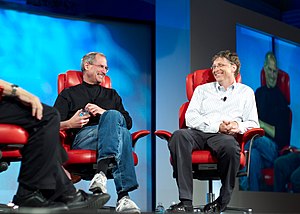
Steve Jobs and Bill Gates at the fifth D: All Things Digital conference (D5) in 2007 (Photo credit: Wikipedia)
The power structures of large corporations need to change. People notice the obvious disconnect between millennials and the twentieth century throwback chief executive officers still in power today. Unemployment for young people remains stagnant and far too high.
Those CEOs who sit behind their desks, insulated from engagement with the up and coming leaders of the business world by layers of people who block any attempts whatsoever at engagement with the public, are not going to thrive indefinitely.
Yes, the stock market is still going strong, albeit on low trading volumes. The chain of command that leads to CEOs still makes sense to shareholders as long as the market bulls are running, too. The annual reports of countless publicly-owned companies are littered with some iteration of, “in order to retain top leadership at (Insert company name here), our executive team compensation packages must be competitive. The word competitive is used too often if you ask me. What is the price of remaining competitive these days? It depends on the company of course, but CEOs can take down anywhere from just under a million dollars annually to over a hundred million dollars at the biggest companies. When you understand some of them make thousands of dollars an hour—an HOUR, and that it is more than many American workers make in a year, your sense of foul play should be activated. I ask you, how does this not stink to the proverbial high heaven?
Inaccessible CEOs no longer have a place in the world today. Sure, many throwbacks are holding on for dear life until they can sail off into their golden parachute sunset. We should not let them have an easy time of it, especially when it comes to being out in front for their stakeholders and company employees.
Many executive team members tout their open door policy. Tune in again for more tired clichés from the last century at someone else’s blog. There is no open door policy at corporations in too many instances. Companies would prefer their employees utilize suggestion boxes—suggestion boxes. I suggest the suggestion boxes go bye-bye—useless relics of failed management systems that no longer serve a purpose in today’s global business environment.
Some CEOs get that they need to be out in front—not down in front. They use social media. They hold press conferences. They conduct employee question and answer sessions (formerly known in the political world as town hall meetings). They are on Facebook. They understand business is global and they blog not only to internal audiences, but to the entire world. Some even tweet and when time is money, even 140 characters is better than “no comment.”
They are accessible.
Steve Jobs would not hold court at a World Wide Developer Conference and say “No comment!” The words “no comment” these days is as good an admission that you call yourself a leader but you are in fact just the opposite. Leaders lead, and in order to be a leader today, you have to put on your big boy or big girl pants and occasionally field questions from the media, and anyone who takes the time to engage you in some fashion.
If the best you can do is no comment you need to shut the front door on your way out.
Back in the day, Jobs’ successor Tim Cook publicly apologized for Apple’s flawed Maps application software. People took it as a sign of weakness. Perhaps compared to how Jobs would have handled it maybe it was. To me, however, the ultimate display of weakness would have been for Cook to have had no comment at all on the subject—how weak would that have been? Sure, he apologized and some say Jobs would never have apologized. But Cook took responsibility and by sucking it up, put himself out there for all to see that he will take credit for innovation when things work, and also take responsibility when things do not go as smoothly as planned—one of the hallmarks of leadership. So, yes, he apologized, but he did not remain in hiding until things blew over. Things do not blow over in the world of news immediacy we live in. Leaders will be out in front, not lurking in the shadows, hoping we won’t notice.
No comment does speak to something.
It speaks to the fact you do not consider yourself to be a company that conducts its business in a transparent fashion. No comment also demonstrates a lack of respect for the people in your charge as well as the stakeholders you look to for admiration and approval. No comment is not cool and indifferent; it just makes you appear lacking and not in control.
Note to CEOs holding on to antiquated strategies like kings and queens presiding over their about-to-rebel subjects: Collaboration is the name of the game now. In order to collaborate you need to make yourself available and share your time. Your sense of self-importance and arrogance is rude.
Young people are on to you and will be changing how the game is played as time goes on. You say you are late to the social media sharing table. That is alright. We can forgive this, but only if you make an effort.
Care to comment?
Related articles
- Most Ceos Do Not Waste Their Time in Social Media (venitism.blogspot.com)



